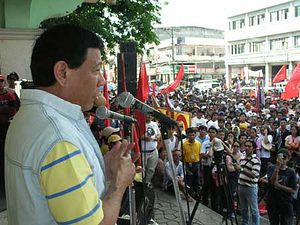Speaking on Sunday, Philippine President Rodrigo Duterte said that he would bring up a ruling by a Hague-based tribunal on the South China Sea disputes between the Philippines and China when he visits Beijing later this week.
The Philippine president, who was inaugurated on June 30, 12 days before the landmark ruling that found China’s nine-dash line claim in the South China Sea invalid, additionally vowed to negotiate on the basis of the ruling.
“I will not bargain anywhere, we will continue to insist that is ours,” he said, speaking in Davao City in Mindanao in the southern Philippines — the same city where he was mayor for more than 20 years. “The international tribunal decision will be taken up,” he added.
“There will be no hard impositions. We will talk, we will maybe paraphrase everything in the judgment and set the limits of our territories, the special economic zones,” he said, anticipating the agenda when he meets his Chinese counterpart Xi Jinping. “It will be no bargaining. It is ours and many of you are wanting to ask the question. No bargaining.”
Though Duterte’s remarks on Sunday suggest an encouraging recognition of the ruling, which China has criticized and refuses to recognize as valid or binding, he has also made remarks that suggest a more conciliatory approach to the South China Sea dispute with China.
For instance, in a speech to an audience of local government officials last week, Duterte said that the Philippines should not “dwell on Scarborough Shoal,” a South China Sea feature that sits at the center of the broader maritime dispute between Beijing and Manila. Scarborough Shoal was seized by China after a stand-off in 2012.
When Duterte travels to China this week, the bilateral agenda will be broad. While the South China Sea dispute between the two countries appears to be firmly on the agenda, the Philippine president will be accompanied by a 200-strong delegation of business leaders.
Duterte’s finance secretary has said that “it’s time for us (China and the Philippines) to lower the tensions,” and that he would like to solicit investment from China while expanding bilateral trade.
Given the range of objectives for the Philippines during Duterte’s China trip, it’s unlikely that Manila will push too hard on the South China Sea. China, meanwhile, could look to move forward with some sort of bilateral resource-sharing agreement for fishing or hydrocarbons at Scarborough Shoal or Reed Bank.
Broadly speaking, Duterte has shown an interest in rebalancing the Philippines’ foreign policy away, seeking to expand ties with China while recalibrating ties with the United States, Manila’s closest ally. The United States has strongly supported the Hague tribunal’s award on the South China Sea, treating it as binding on both parties.

































